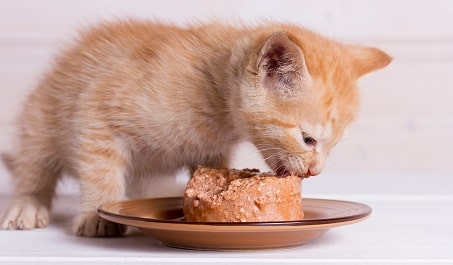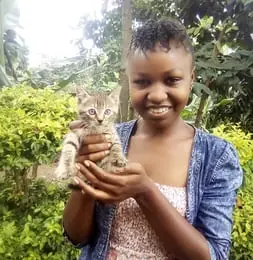
The answer to if a kitten will stop eating when it’s full:
A kitten will not stop eating when its full, as they lack the inner voice adult cats have, to stop them eating when they are full.
To avoid health complications, monitor their feeding habits to make sure they are not overeating.
Go for a vet checkup if your kitten eats without getting satisfied.
There is nothing so satisfying than watching your kitten eat its favorite food. Of course, we expect the kitten to self-regulate and simply stop eating when it’s full, which doesn’t always happen that way.
As a cat owner, you may be worried if your kitten continues to eat when it’s obvious they are full.
This article will tell you if a kitten will stop eating when it’s full, and how to avoid giving your kitten too much to eat.
Monitor How Much Food You Leave Out
Adult cats are usually disciplined when it comes to their feeding habits. You can leave their food out throughout the day, and they pick as they please. When they are full, they stop eating and walk away.
Kittens, however, lack the inner voice that tells felines to stop eating when they are full. So if you don’t monitor them, this can be dangerous. It’s up to you to ensure they are not overfeeding.
Your kitten will not stop eating if food is available, but again this depends on how old they are. If you have a kitten a little less than 4 weeks, it needs to nurse or take milk replacement every 2 to 3 hours.
Therefore, most of the time, you will notice your kitten is crying out for food. At this age, they need adequate nutrition and hydration.
Divide your kitty’s food into 3 or 4 small meals a day.
Personality is also a factor to consider when talking about your kitten’s eating habits. Some kittens will stop eating when they are full, but others might need your intervention.
Kittens Rarely Become Overweight
Let young kittens eat as long as they want to because they grow rapidly until they are about 6 or 7 months. Food fuels their growth and energetic play.
At the same time, you also want to monitor their food intake for it not to cause stomach upsets.
Kittens rarely get overweight, and they need a lot of calories for their size. You can leave food on your kitty’s bowl as long as other pets don’t finish it up.
Kitten Nutrition Basics
Kitten food supplies your little one with the nutrients and calories it needs, but it is easier for its stomach to hold in smaller amounts.
For example, dry kitten food should have about 35% protein and up to 24% fat content; wet food might have less because it is diluted in water.
However, just because your kitten is carnivorous does not mean you can only feed it meat, which can lead to nutritional imbalances.
There is no need to add vitamins or supplements to your kitten’s diet; quality commercial foods are supplemented to provide optimal nutrition.
Why your Kitten is Always Hungry

The huge appetite of your furry friend can be worrying. Here are possible reasons why this can happen:
1. Health problems can be a cause
If you give your kitten quality cat food appropriate to its age, but your little one still wants to eat all the time, this could be a sign of an underlying health problem.
Intestinal worms are a common cause of increased appetite in your kitty. The worms get most of the nutrients, so the kitten keeps on eating, but is unable to satisfy its hunger.
Take your kitten to the vet for regular checkups. Fortunately, there are deworming medications to give your kitty to fix the situation.
2. Overeating can be a behavioral problem
If a vet has ruled out a health problem, it could be that your kitten’s overeating is a behavioral problem. Boredom and stress can affect kittens whose owners leave them alone for a long time, leading them to eat more.
Kittens that were once living in the streets with no guarantee of where the next meal will come from are insecure about food, and eat up everything offered at once.
3. Low-quality food
Think about what happens to humans when we eat junk food. We feel hungry hours after mealtime.
The same thing goes on with kittens; if you give them low-quality food, they tend to feel hungry all the time. Prioritize kitten foods from reputable brands, to ensure your kitten gets all the nutrients it needs to satisfy its hunger.
Invest in Treat-Dispensing Toys

You might be tempted to leave a dish of food open for your kitty to stop by each time it wants to eat. But this might not be such a good idea, because as we saw earlier, most kittens lack self-control.
You can include a food dispenser toy to keep your kitten entertained, and give it the needed exercise as it “hunts” for food. These toys are available in various fancy designs from pet stores.
Symptoms That Your Kitten is Overeating
A kitten needs a lot of food for its growth and development, but too much food can be dangerous. Follow the recommended feeding guidelines from your vet to know the symptoms of overeating, to ensure your little one stays healthy.
Kittens are voracious eaters who may tempt us to give them as much as they want. Here are signs to watch out for that indicates you are giving your kitten too much food:
1. A distended belly
While a kitten’s belly normally has a noticeable bulge after eating, their stomachs should not be too distended. If it looks too swollen, this is an absolute sign that you give your furry friend too many treats.
2. Diarrhea
Diarrhea is an alarming sign that your kitten is eating too much. Healthy kitten poop should be yellow and firm. Loose stools with a sudden color change mean your kitten has diarrhea, which can cause dehydration.
Make a quick appointment with your vet so they can help your kitten before the situation gets out of hand.
3. Vomiting
If your kitten eats too much, it may vomit immediately after eating. If this happens, be quick to clean up the mess before your kitten starts to eat what it has thrown up. It sounds gross but some kitties love to do this.
Remove your kitten from the area, and give their stomach a chance to settle down before feeding them again; about an hour or two.
Just a little drinking water can do for the time being.
Free Feeding vs. Meal Feeding
We have already seen that kittens are growing at a fast rate, and may eat much more than an adult cat. However, you also want to ensure healthy long-term eating habits.
Feeding guidelines are available on the kitten’s food packaging. You can adjust these according to your kitten’s needs.
Feed your kitten at appropriate times of the day. It’s advisable to let it be hungry before it comes to the feeding bowl, but then again, you don’t want it to be feeling so hungry that it devours the whole meal in a few seconds.
There are two main ways of feeding your kitten. To help you make an informed decision, talk to your vet to weigh the pros and cons of each. They are:
- Free feeding method
This is where you leave a bowl of dry food out all the time so that it’s readily available for your kitten. This type of feeding method might be convenient for you if you have a busy schedule.
Your kitten can therefore eat when it wants and when it’s full walk away.
The disadvantage to this type of feeding is that some kittens can overeat and develop stomach complications. If there are other cats in the household, they can easily access the food and eat your kitty’s meal.
It might be difficult to monitor your kitten’s feeding habits when other cats are eating from the same bowl.
- Meal feeding method
This is where you give your kitten specific food proportions at certain times. The method works best with wet food, which easily goes bad, and can’t be left out all day.
This type of feeding helps you monitor how much food your kitten eats. It also helps your kitten practice its hunting skills during the day when it’s not yet feeding time. This keeps it mentally and physically stimulated.
Each of these feeding methods has its advantages and disadvantages. Check with your vet what might work for you.
Kittens between 6 to 16 weeks need to be fed regularly, for about every 6 to 8 hours.
Keeping Your Kitten Well Fed
Just like babies, kittens like food that tastes good. The aroma and texture should be to your kitten’s liking.
Watch how your kitten eats; if it seems to enjoy its meal even growls when you come near to keep you off, then stick to that type of food.
All cats love meat, regardless of their age, breed, or personality. So, don’t turn your cat into a vegetarian; it will simply not like it. Besides, felines don’t need vegetables in their diet for a balanced diet.
It’s also not advisable to let two kittens eat from the same bowl. This leads to competition and aggressiveness. One cat might prevent the other from eating.
